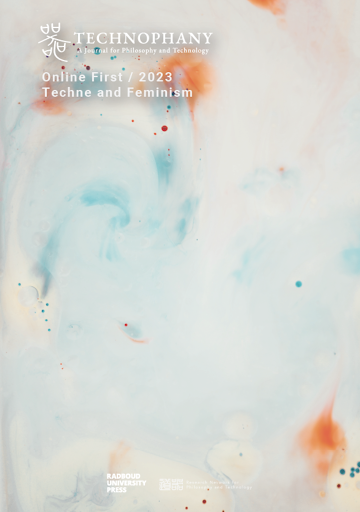Edited by Katerina Kolozova, Vera Bühlmann
[…]
The Cumaean Sybil tangles true things with the uncertain: involvens vera obscuris, as Virgil famously writes. Yet, how to think of such entanglement, such a notion of truth? The Sybil is a Sybil insofar as her chants engage with the given cosmos in ambivalent terms; she accommodates things and events into probabilistic proportions, ratios that are always already interlaced with nature and its inconclusive character. Is there something to be made of such a sibylline approach, in which contingency and rationality are integral to the given? If we think of it in the context of today’s feminist engagements with reason and technology, could the Sibyl’s probabilistic temper help us think in emancipatory terms about the interplay between bios and techné without invigorating nature-culture dualities? Is it possible to conceive nature’s givenness in more foliated manners, in manners where technology is not meant so much to change or make the given, but to enliven more forms of coexistence with its probabilistic ambivalence? In brief, could the Sibyl’s oracular set-up help us deploy more feminist lines of flight regarding the interplay between the technical and the natural with respect to how givens come to be given?
In welcoming rationality and thus embracing the emancipatory figures promised by technical innovation, much of today’s feminist affiliations with technology engage with what Donna Haraway considered the philosophical challenge of feminism as follows:
“So, I think my problem, and “our” problem, is how to have simultaneously an account of radical historical contingency for all knowledge claims and knowing subjects, a critical practice for recognizing our own “semiotic technologies” for making meanings, and a no-nonsense commitment to faithful accounts of a “real” world, one that can be partially shared and that is friendly to earthwide projects of finite freedom, adequate material abundance, modest meaning in suffering, and limited happiness.”
Knowing subjects and historical contingency, real worlds and faithful accounts. Isn’t Haraway’s quest an invitation to think of subjectivity and objectivity as constituting each other without abandoning their own purpose? And is it utter nonsense to cultivate more variations of Haraway’s criss-crossing gesture by pitching camp on the probabilistic givenness sung by the Sibyl, so as to accommodate more biophilic—and perhaps less heroic—notions of technology?
I would like to catch up with the directionality that these questions draw by circling around to how, and whether, the Sibyl’s involvens vera obscuris might be engaging with the question of truth in terms of sensibilia: the cultivation of a sensorium of the rational enlivening more manners of engaging with “whatever (way) thy fortune shall allow”, to put it in the Sibyl’s words. Yet, if we think of “fortune” in connection to a public subjectivity that bears (fors (L.)) the ratios of the cosmos across all bodies and fleshes in a sonic key, could we conceive technical objects as holding a subjective agency or persona (per-sonare)? And, if they are always already enfleshed with nature and its rationality, how to think of their emancipatory dimensions? Perhaps this amalgamation could be considered not so much in keeping with the Promethean claim for making the given, but in pursuit of tuning the strings of the given to unfamiliar or even unknown scales. Making things appropriate without appropriating them: what could it mean to think of technology as a material activity propelling processes of syntonization through and between things and events? And, if we were to propose, in light of Plato’s discussion of the four technai in the Gorgias, conceiving the mechanics at work in such attunements as gymnastic training and cosmetic fashioning, what biophilic articulations with respect to the technical might emerge?
[…]
